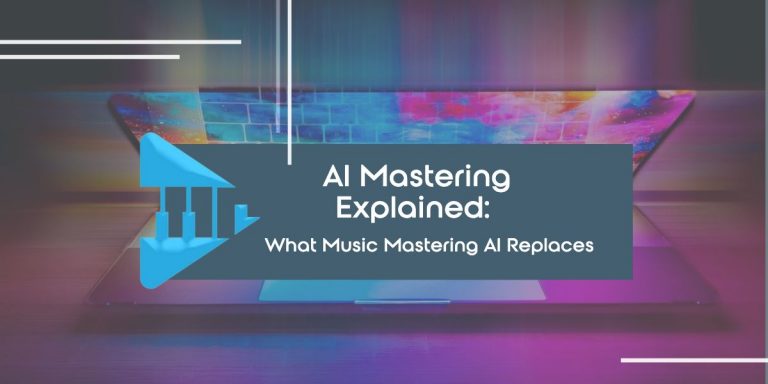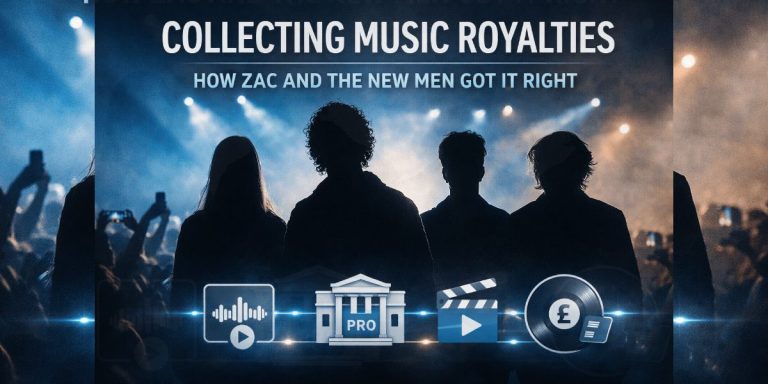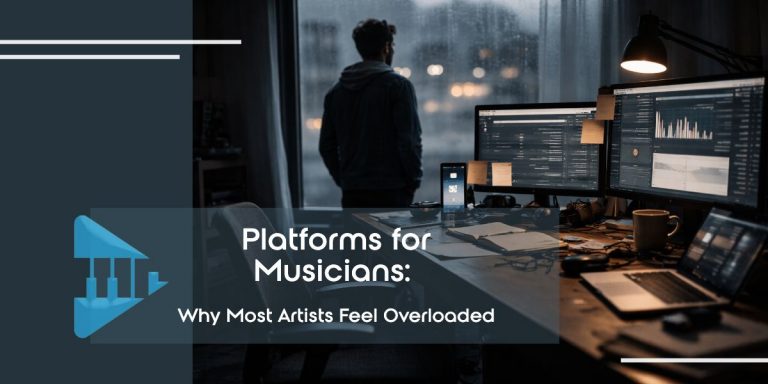Ever wondered why “how to register my music” is such a common search? It’s because the process is anything but simple, and most artists only figure it out after missing money they should’ve earned. This guide breaks down what registration actually means, how to do it right, and what you need to finally get paid for your work.
Table of Content
ToggleTL;DR (Key Summary)
To get paid, register your songs with a PRO, get ISRC and ISWC codes, and sign up with SoundExchange or PPL, plus MCPS or MLC for mechanical royalties. Check all splits and metadata. Even if you use DistroKid or TuneCore, you still need to register your music. Melody Rights helps you keep it all tracked and ready for sync.
Most artists never learn how to register their music the right way. Your tracks are out, listeners are tuning in, the momentum is real, but getting paid from syncs or placements seems impossible. Usually, it’s not about talent. It comes down to a missing code, unclear splits, or just skipping the details nobody taught you. When the paperwork isn’t right, the money finds someone else.
Why Registering Your Music Doesn’t Mean You’ll Get Paid
Registering your music should be step one. Still, it rarely guarantees you’ll see the money. The system runs on codes, splits, forms, and technology that feels stuck in another decade. One wrong detail and royalties disappear into what the industry calls the “black box.”
Recently, PRS for Music revealed over 100,000 live gigs in the UK have generated royalties that sit unclaimed, some even dating back to 2022. In 2019 alone, £2.7 million remained unallocated because songs couldn’t be matched to their creators. After three years, that money is redistributed based on market share, not necessarily to the artists who earned it.
Globally, studies show billions remain unclaimed every year. Royalty Exchange estimated $2.5 billion in unallocated payouts due to missing metadata, outdated systems, and lack of transparency.
Most indie artists get tripped up on basics like missing ISRC or ISWC codes, mismatched writer splits, or missing registrations with PROs or mechanical societies. The result? Your work gets played. Your name doesn’t. Your music earns money, but someone else collects it.
The admin side isn’t why you got into music, but it’s the difference between making noise and making a living. Plenty of artists know their tracks are being played but still see blank royalty statements or unexplained gaps in payment. That kind of frustration usually comes down to registration mistakes or missing info. A single code out of place, or an unchecked box, can send your royalties out of reach.
Most artists only realize what’s missing after they’ve seen money slip by once. If that’s you, you’re not alone.
What Registering Your Music Actually Means
A lot of artists think registration is just one step. In reality, it’s a series of different moves. Each one connects to a different kind of royalty or payment.

Who Owns What? Song Rights Cheat Sheet
| Right Type | What It Covers | Who Usually Owns It |
| Composition Rights | Melody, lyrics, the underlying song idea | Songwriter(s) or their publisher |
| Master Rights | Specific sound recording of the song | Recording artist, producer, or label |
Why it matters:
You need to register both rights to collect all royalties and to license your music for sync. Want a deeper dive? Read our full guide to music rights and sync licensing.
Copyright
This is your legal proof of authorship. In the US, you register with the Copyright Office. In the UK, keep good records and proof of creation. Some use copyright services for backup.
- U.S. Copyright Registration (via the U.S. Copyright Office)
- UK Copyright Service registration
- UK IPO (Intellectual Property Office)
Step-by-Step Copyright Registration Process
Whether you’re in the US or the UK, getting your copyright sorted is your first line of protection and the gateway to royalties.
What Does Song Registration Cost?
- US Copyright Office: $45–$65 per song, online. See fees & processing times
- Copyright Service (UK): £59.50 for 5 years, £99.00 for 10 years. View full price list UK Copyright Service
- UK IPO: Copyright exists automatically, but you may use registration services for proof or clarity. See official guidance
- Other countries: Fees vary. Check your local copyright office.
Remember: These fees cover legal copyright registration. You’ll need separate registrations for PROs, mechanical societies, and performance rights.
Performing Rights Organizations (PROs)
Groups like PRS, ASCAP, or BMI collect royalties every time your song gets played on radio, TV, live gigs, or streaming platforms.
ISRC and ISWC Codes
These codes are like your song’s passport numbers. ISRC is for the sound recording, ISWC for the composition. They make sure your work is tracked and credited to you.
Mechanical Rights Societies
To collect on streams and downloads, register with a mechanical collection society. In the UK, it’s MCPS. In the US, it’s MLC.
Sound Recording Agencies
In the UK, PPL handles royalties for the public performance of recordings. In the US, that’s SoundExchange.
Want to know what a PPL licence costs? Here’s a real breakdown.
Metadata
Metadata is your song’s DNA. That means genre, mood, lyricists, producers, and contact info. If your metadata isn’t complete, royalties can get stuck or your music might be skipped for sync opportunities.
Step-by-Step: How to Register Your Music and Get Paid
Here’s what to do if you want your music to be found, credited, and paid. This process helps with today’s releases and can also help you collect on past plays.
1. List Every Contributor
Write down every songwriter, producer, and musician on your track. Agree on splits before you upload anything. Sorting this early avoids confusion and drama later.
2. Register with a PRO
Sign up with a Performing Rights Organization like PRS, ASCAP, or BMI. Register every song. Double-check that all the writer info and splits match what you agreed on.
3. Get Your Codes
Make sure your track has an ISRC (International Standard Recording Code), which is a unique ID for your specific sound recording, and an ISWC (International Standard Musical Work Code), which is used for the songwriting side. These codes let royalty organizations track your music and pay everyone properly.
4. Register with Mechanical and Sound Recording Agencies
Send your details to the right collection societies. In the UK, register with MCPS for mechanicals and PPL for public performance. In the US, use MLC for mechanicals and SoundExchange for performances.
5. Fill In Your Metadata
Don’t skip this step. Add your genre, mood, all writers and producers, and contact details. Complete metadata helps with streaming and puts your music in front of people looking for sync placements.
6. Double-Check Everything
Look out for small mistakes, missing codes, or splits that don’t match. Even one wrong detail can stop royalties from reaching you, or block your song from getting placed.

Extra tip:This isn’t just about future money. If you get your registration right, you can sometimes collect on royalties from the past. Money that was sitting unclaimed might finally reach you once the details line up.
If you ever get stuck, you’re not alone. Most artists hit a wall with paperwork at some point. That’s when a rights pro or a platform like Melody Rights can help get you over the line.
Curious what songwriters actually get paid when their registrations are right? Find out here.
When Registration Fails: Real Artist Frustration
Most artists don’t notice what’s missing until their payment never arrives. You’ll see this on Reddit and in music forums all the time. A track gets some traction, maybe even lands in a video or playlist, but the royalties never appear.
One user put it plainly in r/musicbusiness:
“Am I collecting all of my royalties here? What else do I need to do to get all my royalties?”
It’s a common question. Sometimes the problem is a missing code or a split that never got updated. Other times, it’s just a box left unchecked on some registration form. Most of the time, it isn’t a lack of talent or exposure. It’s the steps that slip through the cracks.
The lesson usually lands when momentum picks up. You watch your track move, see listeners tune in, but the money is still nowhere to be found. That’s when the admin suddenly matters. It’s rarely exciting, but this is what turns plays into payment.
How to Register My Music, Track Royalties, and Get Paid with Melody Rights
If figuring out music registration feels overwhelming, you’re not alone. Most artists never get taught how to register songs properly or track every income stream. That’s why so much money goes unclaimed.
Melody Rights was built to handle the admin without taking away your control. Everything sits in one clear dashboard. You can see your song registration, codes, splits, sync-friendly metadata, and royalty tracking all in one place. Melody Rights works alongside whatever distributor you prefer. Nothing about your release strategy needs to change. You just finally close the gaps that cost artists money.
This is about more than collecting royalties. With the right music register and the right details, your songs are ready for sync opportunities and placements, not just streams.
Ready to stop letting missing details steal your momentum? Register your songs, track your royalties, and finally see what your music can do. Melody Rights is here to back you up.
Or, if you’re curious what’s possible, try Melody Rights for yourself and start turning plays into real payment.
Frequently Asked Questions
1. How to register my music with PROs and collect royalties?
Register your song with a Performing Rights Organization like PRS, ASCAP, or BMI. Make sure all songwriters and publishers are listed with accurate splits. Once registered, PROs track public uses such as radio, live shows, and streaming, then pay you directly.
2. What steps should an artist take to correctly register songs?
It starts with copyright protection. Then follow these steps:
Register the song title, writers, and splits with your PRO.
Apply for ISRC and ISWC codes.
Sign up with SoundExchange (US) or PPL (UK) for sound recording performance.
Register with MCPS (UK) or MLC (US) for mechanical royalties.
A Reddit user summed it up: “Am I collecting all of my royalties here? What else do I need to do to get all my royalties?” (reddit.com)
3. Do I need to register songs if I already use a distributor like DistroKid?
Yes. Distributors handle digital release and assign ISRCs, but they do not register your tracks with PROs, mechanical societies, or SoundExchange/PPL. You still need to take those steps yourself.
4. How long does it take to register a song?
PRO registrations usually take a few days to two weeks. Organizations like SoundExchange or MCPS can take several weeks. It depends on the society and country. Once completed, monitoring and payment are ongoing.
5. Can I collect royalties for old tracks?
Yes. Even if your song is years old, updating your registrations and metadata can unlock back royalties. Once your details match the system, past plays can finally pay out.
6. How do I register songs and get my music in front of TV, film, games, or ads?
Start by registering your music properly and making sure your metadata is complete, including genre, mood, writer splits, and usage rights. If you want support getting your tracks placed or have questions about sync, contact the Melody Rights team for hands-on help.



